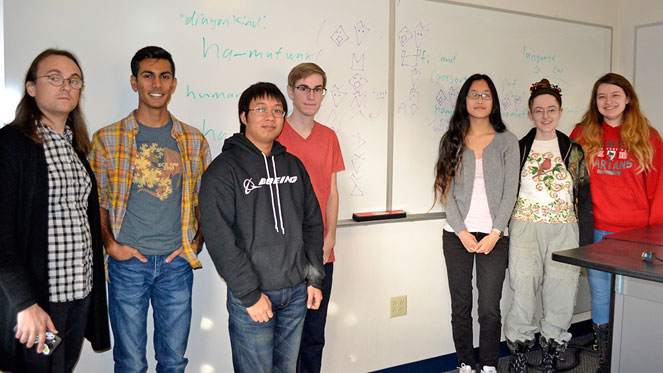
Inventing Languages, One Philosophy Course at a Time
By Correy Dandoy
If you really stop to think about it, language is a part of every moment of every day – from reading written words to talking with a friend or simply being alone in your own thoughts.
But – why do languages work the way that they do? Why do they follow certain rules? "Invented Languages," a Philosophy Department course, was designed to get students thinking about language in a whole new way, and in doing so, inventing their own languages from scratch.
“Usually, when studying linguistics, we look at a language as the reality we're trying to understand,” said B. R. George, assistant professor of philosophy. “In this course, we are coming at it from the other side: you have ideas about what language consists of and then build something to fit that. Practicing this way of thinking can be valuable in many kinds of theoretical work, not just with inventing languages..”
In the past, invented languages have come about in diverse ways and for different purposes. J. R. R. Tolkien’s Elvish languages and Okrand’s Klingon were developed for artistic and entertainment purposes, while the creators of Esperanto and Láadan were inspired by their sense that natural languages were in some way inadequate.
“In linguistics, one topic we explore is the extent to which there's something about humans that limits the possibilities for human language,” George said. “Language construction forces students to think about the space of imaginable possibilities - to think about what options natural languages have and haven't used, and why.”
Natalie Moss, a senior art major, took the course because she is a writer who sets her stories in complex fantasy worlds and wants to include more language aspects.
“It has been challenging work to actually create a language, because they are so big and complicated, especially when it comes to grammar,” Moss said. “I’ve never had to think about things this way because I’ve always spoken languages that follow particular rules. I’m eager to use what I’ve learned in creating a more sophisticated language for my writing.”
Katherine Zhang, a sophomore majoring in linguistics, is creating an auxiliary language for East Asia by combining features of various existing languages. Inspired by Esperanto, she is working to create a language that would be easy to learn for the people there, and not be biased toward any particular culture.
“Invented Languages” is taught through the Department of Philosophy’s Linguistics Program. It also satisfies the creating requirement of the Dietrich College of Humanities and Social Sciences’ General Education Program and is typically offered every other semester.
Related Article:
Language Lovers Find a Home in CMU’s Linguistics Program
Pictured above is B. R. George with students in the Fall 2016 Invented Languages course with their work on a practice language. They’ve been working as a group to create a language as practice for their own individual projects.